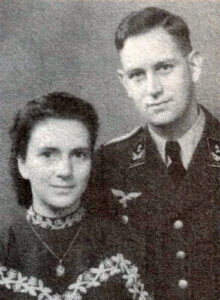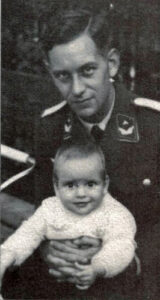Mail Correspondence with Soldiers at War (“Feldpostbriefe”): Last letter of German soldier Werner Hast to his family (Published on 08/11/2024)
Feldpostbriefe and their significance today
When researching Julius Erasmus, one inevitably comes into contact with letter correspondence between soldiers at war and their families from the time of the Second World War, such correspondence being called “Feldpostbriefe” in German. Be it messages about the death of a soldier, written by his superior to his relatives, which were later sent to Mr Erasmus as a hint for a grave search, or other correspondence between soldiers at war and their families at home. Since then, I have also been dealing more closely with field post letters from that time.
Feldpostbriefe are valuable contemporary documents that unfold their timeless message, especially in times like the present, and convey a vivid impression of what war means to all involved. They are a valuable tool to ward off the very beginnings of a renewed striving for war and perhaps to help prevent history from repeating itself once again and with yet more gruesome consequences for mankind. At present, war, weapons and the killing of people on a large scale are once again being drummed up forcefully, although for decades one could have had the vague hope that mankind had finally learned its lesson to some extent from the painful experiences of two world wars in particular. Unfortunately, this does not seem to be the case once again.
With this in mind, appropriate letters or letter excerpts from various sources will be published here from time to time in the section “Mail Correspondence with Soldiers at War (Feldpostbriefe)” as a reminder of what war means to man and mankind. To provide food for thought and in the unshakable hope that this may make a difference.
Last letter from the German soldier Werner Hast to his wife Inge and his children (source: Volksbund Deutsche Kriegsgräberfürsorge, Letzte Lebenszeichen – Briefe aus dem Krieg, p. 89 ff. (translation from German language)):
“Dearest Käthe!
My Ingelein!
On two flights it was already very difficult to get back home, and on one flight we didn’t believe for a long time that we could still make it! It went well again because we didn’t lose heart and because we were lucky enough. Afterwards, we celebrated our ‘birthday’ at our home base in the old flying tradition. – If you receive this letter today, it will tell you that I have not had enough luck in a difficult situation and that I will probably not return – to my home port, home to you and the children. But I don’t want strangers to be the first to say these bitter words to you, I myself want to say ‘Farewell’ and hope that this will make it a little less difficult for you to say goodbye.
I would like to thank you once again today for the unspeakable love and loyalty that you have always shown me during the long, difficult and beautiful years that we have been together. Life was so unimaginably wonderful for me when I could be with you – and we made good use of our time! I can only think of the weeks in Zwischenahn and the vacation days last winter and spring! – I can only wish you and the children luck and steadfastness for the future, because it won’t be easy for you! But always remember how many women before you have had to give up their husbands and how many more will have to do so in the future. All this is necessary so that the children can grow up and live in peace and security. If it ever becomes too difficult for you, then think of our two daughters and our third, who need you, for whom you are there and in whom I continue to live!
I greet you for the last time, my dear Inge wife, you, my big Karin, you, my little Renate, and you, my unborn little one, whom I have not yet seen. I kiss you from the bottom of my heart
Your Werner.
A comrade has taken this letter into safekeeping and is sending it to you now that I am missing and there is almost no hope of hearing anything more from me.”
Werner Hast, born on 04/12/1912 in Berlin, fell on 30/10/1944 in Norway. He was buried at the German military cemetery in Bergen-Solheim/Norway.
(Head picture: Marguerite on the grave of two unknown soldiers
at the German military cemetery Vossenack, June 2023)
If you wish to support my work, you can do so here. Many thanks!



